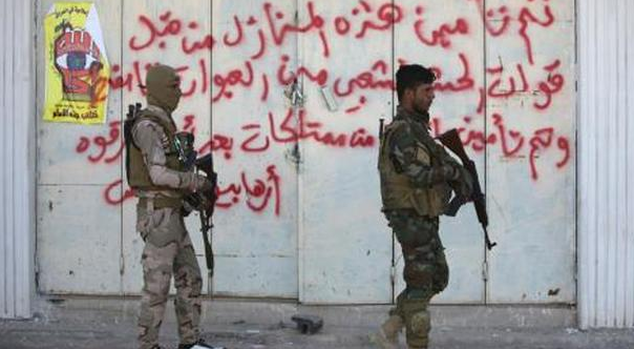Reports of fresh fighting a week after Baghdad announced its victory over Tikrit provides a portent of what may still be to come for Iraq.
The month-long battle for Saddam Hussein's hometown entered its final stages last Wednesday. But Iraqi politicians have done little to halt their mission to drive out the Islamic State group (IS) from morphing into a sectarian campaign.
Indeed, for as long as Iraq's Sunni community is exposed to sectarian attacks, the liberation of Tikrit will continue to ring hollow.
These disturbing levels of violence suggest the country has slid back into a culture of revenge, and it hasn't come out of nowhere. In December, Lieutenant Colonel Haidar Mohammad Hatem of the Iraqi army told the Reuters news agency of "kill zones" - former civilian areas transformed into uninhabitable lands.
"We consider everyone in these zones to be members of the Islamic State group", he said.
The government's rhetoric on recurrent human rights abuses is also riddled with contradictory claims. A week before the battle came to a close, the government denied any human rights abuses had occurred. Yet Monday, Abadi confirmed that close to 64 houses and 85 shops had either been burned or razed subsequent to Tikrit's liberation.
The initial fault for this resurgent sectarian fighting lies with the Iraqi government and, further back, the US. The creation of the "Sunni awakening" - a policy to arm and train Sunni tribes, particularly in Anbar, to counter the rise of Sunni extremist groups such as al-Qaeda in Iraq – has badly backfired While the "awakening" did contain al-Qaeda in Iraq to a degree, it left the country with a heavily armed Sunni militia prepared to fight for its own interests. The government's subsequent attempt to dissolve the "awakening" groups into a 'National Guard' under the command of Baghdad to IS - the direct successor to al-Qaeda in Iraq - has failed embarrassingly.
On the Shia side, the powerful militias of the last decade, such as Muqtada al-Sadr's Mahdi army, have been reformed into what is now known as the "Popular Mobilisation Units". These militias answered the call of Grand Ayatollah Ali al-Sistani to protect Iraq's holy Shia shrines after the fall of Mosul to IS. Iran has also promised to protect the shrines, a promise that continues to justify Iranian interventionism in Iraq, and binds the militias to Tehran.
Thus the crisis in Iraq is becoming one of Sunni and Shia rivalry, and a sad and conspicuous divergence from a common history, identity and objectivity.
The Iraqi government cannot sponsor one identity at the expense of another - and ought to have learned by now that Sunnis cannot be beaten into submission.
No victory in Tikrit will guarantee stability, nor allow the country to reconcile its past, when sectarian issues remain unsolved. For now, as far as Iraq's Sunnis are concerned, the liberation of Tikrit, and other IS strongholds, brings promises that are far from the realities they face.
The early optimism Iraq felt as gains were secured in Tikrit has dissipated as mass graves are discovered and another state victory triggers outbursts of mob activity – which could deepen Sunni Iraqis distrust towards their own government.
Read More


 RSS Feed
RSS Feed